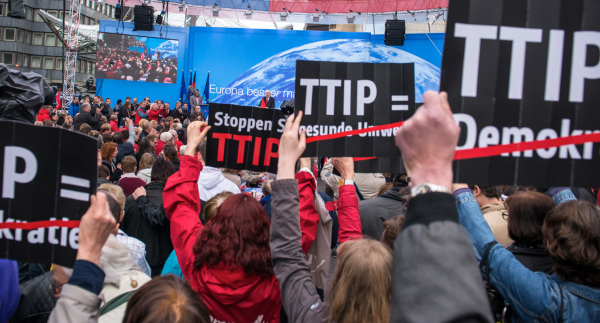THE SELF-ORGANISED EUROPEAN CITIZENS’ INITIATIVE AGAINST TTIP AND CETA has reached over 1,200,000 signatures. You can see the interactive map with signatures by country HERE
In spite of having very little press and apparently a very low profile as far as ordinary people’s discussions are concerned, millions in Europe are resisting this new ‘Free’ Trade agreement which is seen as a deepening of the neoliberal model. Just as Latin American countries resisted ALCA and promoted the much more user friendly ALBA, Europeans are preparing alternatives that would not give Banks and Corporations even more control over the lives of the population.
From the Stop TTIP a blog, a new study about ISDS
THE HIDDEN COSTS OF EU TRADE DEALS
January 15th, 2015
A new report published by Friends of the Earth investigates lessons learnt from past investor state arbitration cases within the European Union (EU) Member States
The Hidden Costs of EU trade Deals: Investor-State Dispute Settlement Cases Taken against EU Member States is a great contribution to the heated debate on the inclusion of ISDS-mechanism in the CETA and TTIP Free Trade Agreements.
The report investigates ISDS involving EU Member States since 1994, taking into account that data is limited because of the considerable lack of transparency around investor-state arbitration cases. Therefore, the research can only skim over the overall phenomenon.
Essentially the report explains the current debate on the inclusion of investor state arbitration by analyzing recent European cases. The three main conclusions add valuable points to the current discussion.
First, the report finds that past experience with ISDS mechanism shows that it puts at risk a government’s ability to introduce new regulations that protect governments and/or people.
Second, it highlights the vast costs that ISDS tribunals put on taxpayers. The largest amount paid by an EU Member State was over € 2 billion, when Poland entered into a settlement agreement with the insurance enterprise Eureko (Eureko vs Poland, August 2005). It is also important to note that when a state wins an arbitration settlement it doesn’t mean that it is exempted from having to pay any costs. Tribunals can decide that costs should be split. OECD estimates that legal and arbitration expenses for a single ISDS case amount to $8 million.
Finally, the report argues that EU Member States will experience a great increase in investor claims if TTIP and CETA are ratified. The reason for this is that to this date no trade agreements exist between the EU and high capital-exporting countries. Thus TTIP and CETA will open the door to a high number of investor claims against EU member states.
Read the full report here






